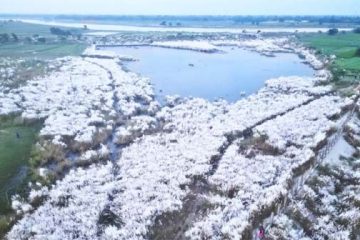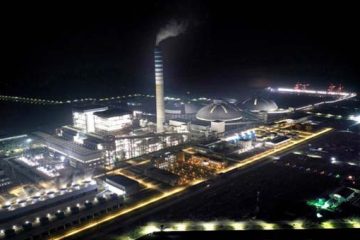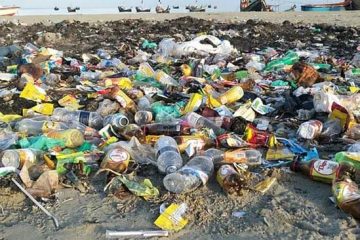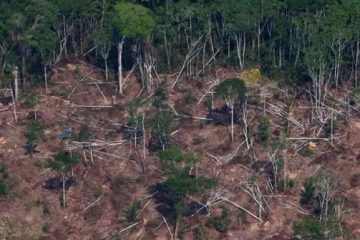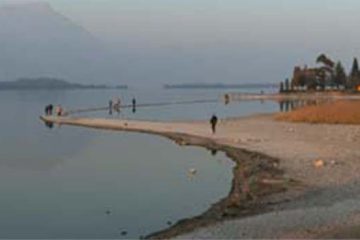Dr. M.A. Bashar
 It is learnt from newspapers very recently that in the Sundarbans area three large constructions will take place which are very dangerous and detrimental to normal functioning of the mangrove forest ecosystem. It means that the interactions between biotic and abiotic factors will be seriously hampered in the ecosystems conservation. The projects are: construction of coal-based electric plant; depot for storage of coal in Phulbari; and a ship-yard covering large area. Already it is protested by various environment related organizations. The Forest Department has also shown its reservation. And Ramsar Convention points out that if these three constructions are done in the Sundarbans area then biodiversity in the ecosystem will be seriously hampered.
It is learnt from newspapers very recently that in the Sundarbans area three large constructions will take place which are very dangerous and detrimental to normal functioning of the mangrove forest ecosystem. It means that the interactions between biotic and abiotic factors will be seriously hampered in the ecosystems conservation. The projects are: construction of coal-based electric plant; depot for storage of coal in Phulbari; and a ship-yard covering large area. Already it is protested by various environment related organizations. The Forest Department has also shown its reservation. And Ramsar Convention points out that if these three constructions are done in the Sundarbans area then biodiversity in the ecosystem will be seriously hampered.
Ramsar Convention (Ramsar sites) is concerned with Wetlands of International Importance. The convention was signed in Ramsar (Iran) in 1971 and came into force in December 1975. This convention provides a framework for international cooperation for conservation of wetland habitats. The Ramsar convention was adopted to halt the continued destruction of wetlands, particularly those which support migratory waterfowl, and to recognise the ecological, scientific, economic and recreational values of wetlands (Kusler and Kentula, 1990; Hails, 1996). The convention places general obligations on contracting party states relating to the conservation of wetlands throughout their territories with special obligations pertaining to those Wetlands of International Importance.
The Ramsar convention covers fresh water, estuarine and coastal marine habitats and includes more than 844 sites with a total area of more than 54 million ha. Up to 1998, the 94 countries that have signed the Ramsar convention agreed to conserve and protect their wetland resources and designate for conservation purposes at least one wetland site of international significance. A widely cited definition of wetlands is found in RAMSAR convention, such as: areas of marsh, fen, peatland or water, whether natural or artificial, permanent or temporary, with water that is static or flowing, fresh, brackish or saline, including areas of marine waters, the depth of which at low tide does not exceed six metres. Bangladesh signed the convention in 1972.
By this time letter on behalf of Ramsar Convention has been written to the government of Bangladesh expressing concerning that, these three constructions will release huge amount of carbon in nature, large volume of sulphur and dust particles. Coal burning will produce high rate of sulphur, this will increase sulphur dioxide in the atmosphere and increase possibility of acid rains. The Ramsar Convention points out that no survey has been made so far on the question of bad effect of such releases on the biodiversity of Sundarbans ecosystem. The global organisation asked the government to produce data on the matters and send to its head office. The global organisation also pointed out that according to the Bangladesh Environment Conservation Act (1997) and Environment Conservation Law (1995) the country cannot go for such constructions in the Sundarbans area.
Our concern is not political or administrative. The people of the country have got every right to know about healthy sustenance of the unique ecosystem situated in Bangladesh coastal area. We are to see how the largest mangrove ecosystem is scientifically affected and brutally tortured on the question of development hoodwinking environmental soundness. How the biodiversity is crying only to survive in the planet on the point of its right to be survived there. It is learnt that if a 500 megawatt electric plant is set up in an area it will produce (per year) 37 lac tons of carbon dioxide, 10 thousand tons of sulphur dioxide, 10 thousand tons of nitrogen oxide, 500 tons of dust particles, 720 tons of carbon monoxide, 170 tons of mercury, 225 pounds of arsenic, and 114 pounds of lead.
It is learnt that the electric plant (coal-based) to be constructed in the Sunderbans area will be of 2640 megawatt capacity. In that case just calculate the volume of dangerous pollutants it will release in the ecosystem. In addition to that other two constructions will release more pollutant materials. If this is the situation of the environmental degradation to be faced in the Sundarbans area because of the constructions to be made, then both the plants and the animals in aquatic and terrestrial habitats will have to collapse with their photosynthetic and respiratory activities choked. No plant-animal interaction will be functional in the area. And consequently Sundarbans ecosystem will lose its status.
Such drastic environmental degradation attempts are very open to the people of the country. People of the country have right ask the authority what about the query of the Ramsar Convention regarding the situation? It is to be remembered that such degradation of biodiversity in any ecosystem of the country will cause biological degeneration for the people in future and it may soon to be happened if not checked now.
(Article originally published on The Daily Star)
The writer is Professor, Department of Zoology and former Dean, Faculty of Biological Sciences University of Dhaka.

